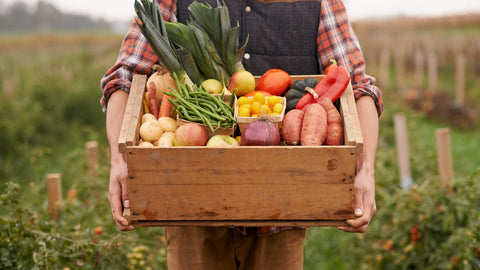
The Farm Bill, an important piece of agricultural legislation, has traditionally focused on farming and food policies.
Surprisingly, it did not include any legislation related to food waste until 2018.
As negotiations begin for the 2023 Farm Bill, there is an opportunity to address the pressing issue of food waste and work towards achieving lofty federal goals of a 50 percent reduction by 2030 (!!). Yes, we can do it! And things are looking promising that new measures might be passed with the 2023 adjustments.
The Need to Address Food Waste
Food waste is a significant problem in the United States, with a staggering amount of 108 billion pounds of food wasted annually. This means that an astonishing $444 billion is spent in the United States to grow, process, transport, and dispose of food that never gets consumed.
Food waste not only impacts our wallets but also takes a toll on our environment. Uneaten food accounts for approximately 16% of US agricultural land and enough energy to power over 50 million homes.
Moreover, food waste contributes to the climate crisis by generating methane in landfills, a potent greenhouse gas responsible for 4.4 gigatons (uh, yes - a massive amount) of carbon dioxide emissions.
With this significant scale of impact, it's crucial to take action and explore sustainable alternatives.
Enter : The Farm Bill
Lawmakers are increasingly realizing the connection between food waste and climate change. Interest in addressing food waste is expanding beyond the agricultural committees to members of Congress and the Senate concerned about climate change. That's the good news: a recent report recommends 22 pieces of legislation related to food waste prevention, surplus food recovery, food waste recycling, and food waste reduction coordination for consideration in the 2023 Farm Bill. Finally, some air time for this important and timely issue.
The 2018 Farm Bill made strides in curbing food waste by including provisions such as funding for a Food Loss and Waste Reduction Liaison at the U.S. Department of Agriculture (USDA) and support for developing municipal composting plans. Reauthorizing the community compost and food waste reduction grant program is crucial for continued progress.
Tackling food waste enjoys broad support due to its multifaceted impacts. From addressing the hunger crisis affecting millions of Americans to conserving resources and meeting climate change goals, food waste reduction has become a non-partisan issue. The odds of incorporating food waste legislation into the 2023 Farm Bill are high.
Funding Priorities and Legislative Solutions
Although recent funding priorities released by various organizations did not explicitly focus on food waste reduction, legislative solutions can still have a significant impact. Recommendations include launching a national food waste awareness campaign, providing grants for organic waste processing infrastructure, and implementing certifications for businesses demonstrating food waste reduction. These measures collectively have the potential to make a substantial difference in food waste reduction.
But what are we up against?
While including food waste legislation in the Farm Bill is easier than passing standalone bills, challenges such as inertia, lack of knowledge, and competing priorities may hinder its adoption. Additionally, upcoming mid-term elections could influence policy decisions and the issues that take center stage.
Despite the challenges, there is cause for optimism regarding the inclusion of food waste legislation in the 2023 Farm Bill. The non-partisan nature of the issue and the growing awareness surrounding food waste increase the likelihood of good support from lawmakers.
The Role of Legislation - and you! - in Tackling Food Waste
Enacting food waste legislation is an essential step towards addressing the problem. However, it is crucial to recognize that legislation alone is not sufficient. It is vital to consider the broader policy landscape and the actions individuals can take in their daily lives to combat food waste.
Where do Upcycled Foods come in?
Upcycled foods are a powerful lever in the fight against food waste. Upcycled foods (such as Pulp Chips!) utilize ingredients that would otherwise go to waste, creating products with verified supply chains and positive environmental impacts. This emerging industry has already gained consumer traction, with a growing demand for sustainable and responsible food options.
The Upcycled Food Association (UFA), along with its partners, urges Congress to prioritize food waste reduction by incorporating the following recommendations in the 2023 Farm Bill:
1. Financial Incentives for Businesses: Implementing federal tax incentive programs can encourage commercial adoption of food waste reduction technologies, overcoming upfront costs and driving progress towards sustainability targets.
2. Grant Funding for Technology: Increased funding for research and development of upcycled products and technologies will curb food waste throughout the supply chain, benefiting both the agriculture and manufacturing sectors.
3. National Food Waste Education Campaign: A comprehensive educational campaign is needed to raise awareness about food waste, including the promotion of upcycled products as impactful ways for individuals to combat this issue.
Investing in the upcycled food industry has far-reaching implications. Companies producing Upcycled Certified® products support thousands of jobs, and sales of these products have shown significant growth. By diverting billions of pounds of food from being wasted, the industry stimulates local and regional economies, fosters innovation, and creates sustainable employment opportunities.



